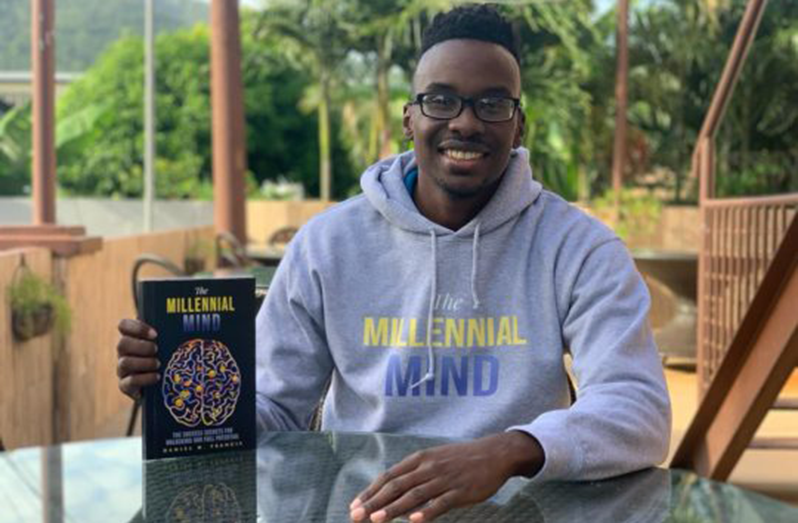-Daniel Francis unlocks the secrets to success
By Richard Bhainie
DEPARTING the school system and venturing into a world unknown, many young adults are often ill-prepared for the realities of “life after the system”. Daniel Francis, a Trinidadian personal development coach, in his book “The Millennial Mind: Success Secrets for Unlocking Your Full Potential”, elucidated some of the struggles millennials face as a generation and how these young adults can overcome struggles and maneuver through adulthood.
The Guyana Chronicle recently interviewed Francis, who used his own experiences to provide more insight into the issue. A google search of the term would explain that ‘millennial’ is used to describe the generation born between 1981 and 1996. However, the advice Francis provides is not limited to millennials, but also those of the next generation, Gen Z. The youngest millennial would be around 25 this year, while some Gen Zs will also be entering adulthood.

Francis explained that upon leaving school, his ambition was to pursue a career in medicine, however, after multiple attempts, it never came to fruition. Feeling like he was thrown out into the world, he had no definite structure to follow and the lessons he learnt in school did not always resonate with reality.
“When we become adults and we enter the world of adulthood, we find that we struggle because what we imagine it would be like, it’s definitely not like that. You were taught that you get your degree, you will get a job, but in reality we struggle to get jobs,” Francis said.
“When we do get a job the vision of the company does not align with us, so we find it hard to settle and then we always want to move faster because we’re always told that we’re better, but that’s not the reality of it,” he added.
More alarming to Francis, a millennial himself, was the amount of young adults that were suffering in similar ways. After successfully becoming a personal development coach and helping others like himself, he compiled the common challenges millennials face and addressed them in his book.
PUSH-PULL FACTORS
From birth to the end of one’s school life, they are instructed about everything that they need to get done. They abide by a routine and everything is already structured in a particular way for them do. This is what Francis terms “the push factor”. “When we start off in school, we go through what I call the push factor. The push factor relates to everything being structured for us. We’re just told what to do and we are constantly being pushed to get things done; we have assignments to do, exams to study for, we have quizzes to take, we might not want to do these things but we are pushed in that direction,” he said.
This is the way life is for our early formative years. However, when you enter adulthood, everything drastically changes; there is no structure for you to follow, and you are given the discretion of choice, with an abundance to choose from. The push factor aligns individuals to become reactive whereby you are programmed from an early age to do things because you have to. To combat this, Francis teaches “the pull factor”.
“In order to create a pull factor, you have to have something to pull to you. The pull factor is telling yourself to get out of the auto pilot setting and start saying in this present moment I am X, where do I want to be in a month, in a year or in five years, and how do I make tangible steps to get there. So now you’re not being reactive, but you’re being proactive,” Francis explained. “The good thing about proactivity is that you’re going to start aiming for things, making those steady steps towards it as oppose to always reacting and you never know where you’re going to go,” he added.
PURPOSE
While a useful starting point is to break away from being pushed, and to find something to be pulled towards, this is where another struggle arises for young individuals. With access to the internet from birth, an abundance of information and resources and a gamut of choices, to identify something to channel your energy towards may be one of the greatest challenges. In these regards, Francis encourages them to find their purpose. “When you start funneling your energy around purpose, you would find that you will have distractions but they will not have such a strong hold on you,” he said.
Being able to acquire satisfaction through watching one more episode on Netflix or having the most kills in PUBG, young persons have developed a propensity for short-term thinking; rarely one would immerse themselves with great thought of ten years in the future. However, to think in the long-term, set goals and work towards them provides a purpose to be pulled towards. But how does one find purpose? Francis explained that young persons are in the perfect position to do so. With the resources available to them, they are afforded the opportunity to dream, and dream big. He empasised that there is no harm in trying as it is through trials and tribulations that passion arises.
“In finding your purpose you need to find your values and the next thing is what are you passionate about. Purpose and passion go hand in hand. There is no right or wrong way to find passion,” he said. If you would like to know something, Google it; if you would like to find someone, Facebook them; in a second, the information presents itself. Accustomed to immediate gratification, the concept of patience has been forgotten and the thought gradual accumulation is somewhat non-existent.
“If you think of life as a sprint, you will run out of gas. This is a marathon we are in and if you don’t have a marathon mentality of taking it slow and steady, you will find that you will hit a wall,” Francis said Without patience, purpose is lost. “Patience comes with the pull factor, you can’t create the plan and not stick with it,” he added.
COMMITMENT PHOBIA
Somewhere along the line of being patiently pulled towards your purpose, the thought hits– what if I had done something else? What if there is someone better? And off to the next best thing we go, breaking the chain of reaching our goal and starting all over again.
“Social media plays a role in that because social media portrays that the grass is greener on the other side and that the option that you didn’t pick is looking better than the option you’re in right now,” Francis noted. “We grow up with all these resources, all these options, it can be overwhelming. You’re fearful of committing to something, you can be in your relationship and still talking to other people just in case,” he added.
Francis explained that this is one of the major struggles for young adults, wanting to have a hold of everything that they stretch themselves so thin not realizing the impact they can create if they remain committed and channel their energies into one thing.
NO QUESTION IS A DUMB QUESTION
Another issue inherited from the classroom is the fear of looking dumb by asking questions. However, this can evolve into something much larger in adulthood. “On social media, all these people are posting their ‘perfect lives’ that’s what we do for the glam. We don’t portray ourselves, we portray what other people want to see of us. Meanwhile, you portraying this life but you may be suffering. Nobody knows you’re suffering because you’re portraying this perfect life,” Francis said.
He added: “This comes back to not wanting yourself to be perceived as weak, or not making mistakes, you want to create this illusion that you’re perfect but by doing so you’re creating more harm. How can you get the help if no one knows you need the help and if you’re not asking for the help?”
He explained that learning comes through failures, and through experiences. There is nothing wrong with inquiring, with seeking help and life does not have to be Instagram perfect. There is no doubt that the millennial and ‘Gen Z’ generations are faced with an unorthodox reality. Navigating young adulthood can be quite challenging, with so much to figure out, so much available to figure it out from and what feels like so little time. Francis, in his book, seeks to address these challenges and provide guidance for young adults. Each chapter with a story highlights a problem. He gives solutions and there’s a self-reflective exercise at the end with affirmations. His book can be purchased on Amazon.




.png)









